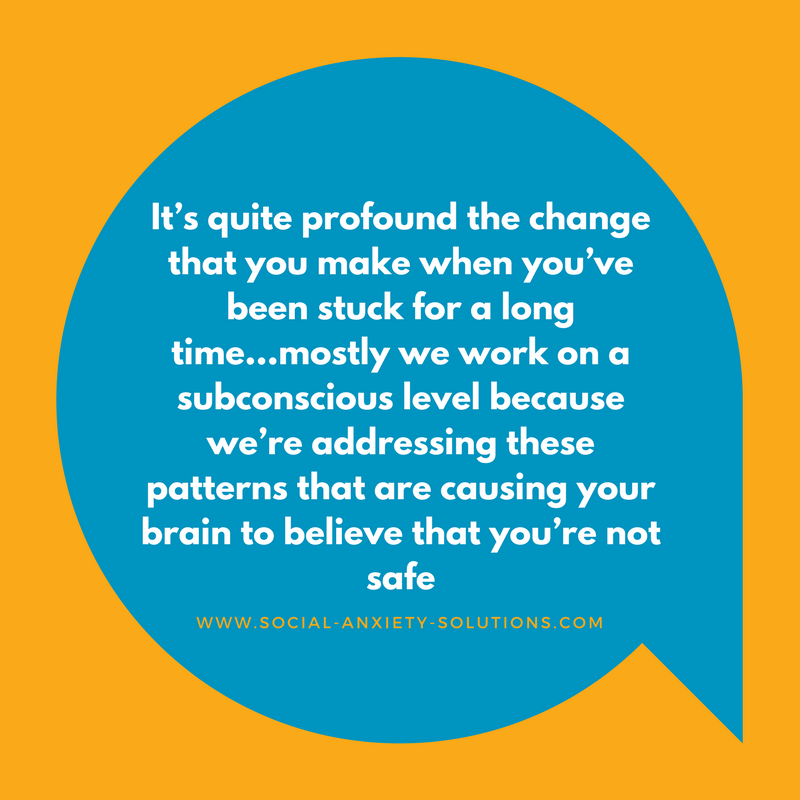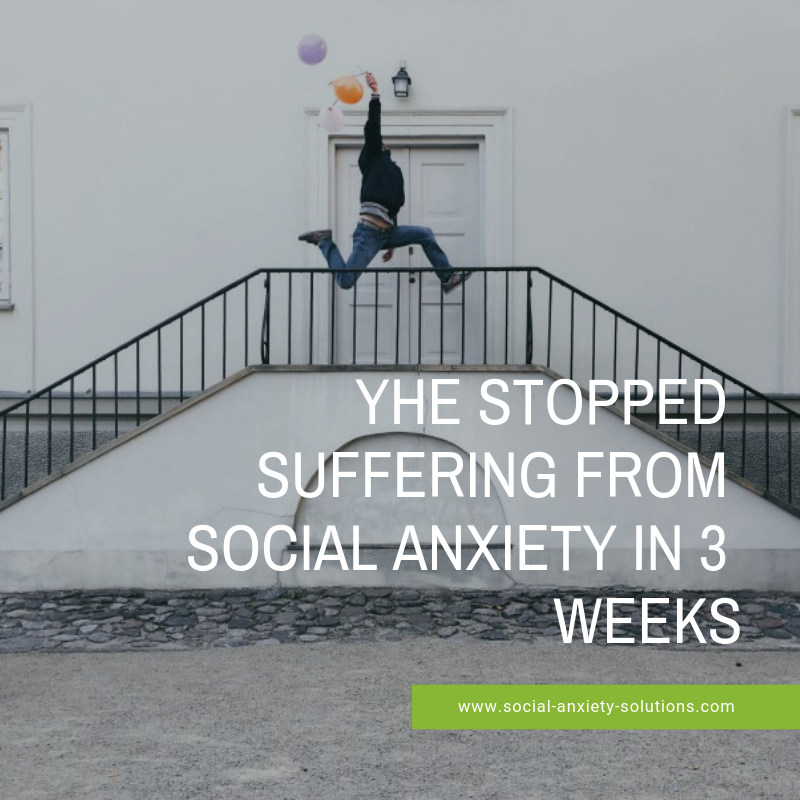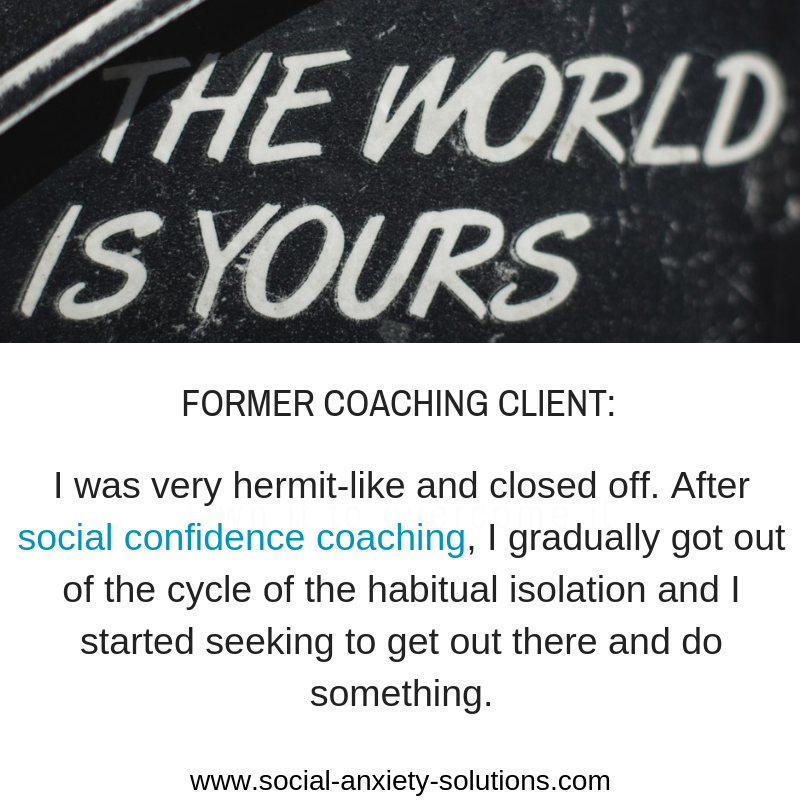SUMMARY
Coaching to beat your social anxiety: http://www.social-anxiety-solutions.com/social-confidence-coaching-3/
Visit the above link to learn more about how to overcome social anxiety. Learn about the power of EFT. See more testimonials. Get an overview of the coaching process. And if this is something for you, register for a free 20 intro-chat.
Quotes:
I was always looking for a way out of it (the social situation). I’d feel like everyone was inside of my head, I had completely unnecessary level of being anxious. And it just was very debilitating. I always looked for a good time to leave. I thought people felt I was weird, or off. I was really closed off before the coaching, very hermit-like. Not much energy to go out and do things. After the coaching I gradually got out of that cycle of the habitual isolation to the point where I started seeking to go places and really wanting to get out of the house and do something. It’s much, much better. It’s to the point it still surprises me (how good I feel) cause I’ve been isolating for so long. I’m much more calmer, much more present in the moment.
I have so much more self acceptance man. That’s been big for me. I feel I’ve been more able to express myself without fear of judgment or criticism. I can just express myself and if someone doesn’t like me: OK. Like alright, that’s fine. There’s been a lot of peace in that. I’m feeling better about myself too. This was a wonderful experience. It’s amazing to me, at times throughout my day I just significantly notice the differences tapping has made. I go like “wow I wasn’t comfortable doing this a few months ago”. It works man, it works miracles”.
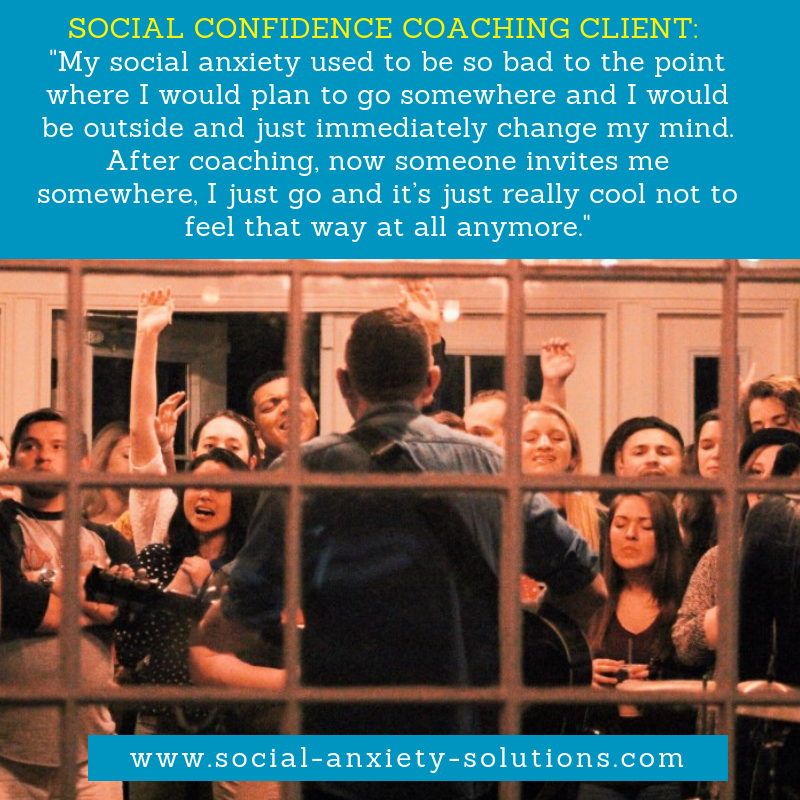
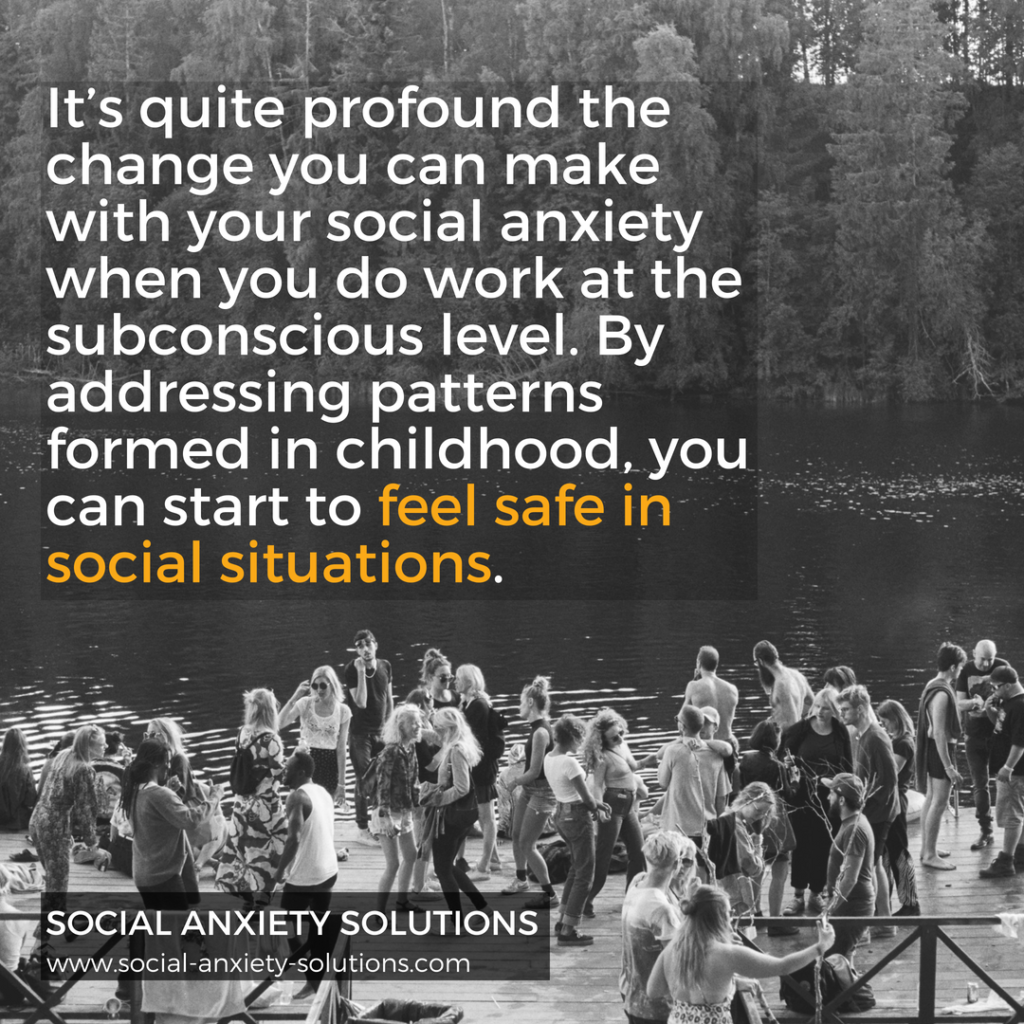
FULL TRANSCRIPT
Intro: Hi. My name is Sebastiaan van der Schrier and I’m an ex-social anxiety disorder sufferer. And I’m also a social confidence coach and I’ve been coaching socially anxious clients since 2009. And I started doing that after I resolved the bulk of my own social anxiety. And for that, I used a technique called EFT. That’s a bit different from your typical change your thoughts, face your fears approach, which I tried. That didn’t work for me. I talked all about that on my website besides the point of this video. So what is EFT? EFT is a scientifically proven to be effective technique that is very efficient in releasing stress, letting go of negative emotions quickly. And I’m talking about shame, fear, anxiety, guilt, insecurity, all the feelings that we’re dealing with when we’re suffering from social anxiety.
So what this technique does is you focus in on something and then you tap on certain acupressure points on the body. Now, you probably think this is a scam or this is nonsense or whatever. But look it up. Look it up online. EFT, emotional freedom techniques. It’s used by millions of people worldwide. It’s recommended by PhD’s. It’s been on Dr. Oz, Psychology Magazine. It’s scientifically proven to be effective. It is amazing and it will rock your world.
Now, it’s a psychological form of acupuncture, but instead of using needles, you tap with the tips of your fingers in specific acupressure points in the body. And when you do that, while you focus on a specific problem, it disconnects the emotions from the problem that you’re thinking about. So very simply said, you think about an upcoming social situation, you feel anxious, you do the tapping (and it needs a bit more instruction than this, but I’m simplifying it), and it disconnects the anxiety from what you’re thinking about. Very powerful.
Now, what it does is it combines the knowledge of ancient Chinese medicine with modern day psychology, and that combination allows for really rapid results.
Now, I’ve used that to overcome my own social anxiety and I’ve been coaching socially anxious clients for seven years, and what follows is an interview with one of my clients. His name is Tavon Walker and we worked for three sessions, each session lasting 90 minutes, over a period of just three weeks. And this is about a month after we finished our coaching because (here’s a bit of a spoiler) he resolved his social anxiety.
Now, here’s a bit of a disclaimer about that. It doesn’t happen for everyone within three sessions. But in about 35% of the cases, people resolve their social anxiety within just three sessions. Now, he will start talking… He will explain how he felt before, how he experienced his social anxiety. He will tell you about what he experienced during the coaching, how he experienced the tapping. I asked a bunch of questions that I found online about how to give a good testimonial. And it’s a fun interview and he’s a really nice guy. And I think you will enjoy it and it will give you a good idea of what to expect and what this EFT thing is a little bit and what this might be able to do for you…
Tavon: Thank you.
Sebastiaan: Nice. Yeah. So I have a bunch of questions so that this is a little bit structured.
Tavon: Alright.
Sebastiaan: So I thought I’d just fire off the questions. I mean, I’m very curious to hear about things, but via those questions, I’m going to hear it anyway. Okay?
Tavon: Cool. Okay.
Sebastiaan: Alright. Awesome. Okay, so where did I hide those questions? Right. Okay. So what was the obstacle that would have prevented you from investing in coaching? What were you kind of like “I’m not sure…”?
Tavon: I think for me personally, I think the financial part of it was probably something that discouraged me in the beginning. I guess paying for it and then being afraid that I wouldn’t see any results. I think that was the biggest fear probably when it came to actually seeking out the coaching.
Sebastiaan: Okay. Alright. And what did you find as a result of the coaching process?
Tavon: Man, I’m so glad I did it. I want to do it again at some point. Like I said, that one time when that person had put that… they were putting a review for the sessions with you and saying how they had gradual changes over time. That’s pretty much how I feel. It’s definitely been gradual. It’s definitely gotten a lot better, too. It just keeps getting better.
Sebastiaan: Good. And how was it before the coaching, like your social anxiety? If you were to describe your situation, what was it like? What was your life like? How did you experience the anxiety? In what situations did you experience it? How was it affecting your life?
Tavon: Yeah. Just really closed off before the coaching. Very hermit-like, closed off, not much energy to go out and do things. And after the coaching, just gradually, I got out of the cycle of the habitual isolation and it got to the point where I started seeking to go places and really wanting to get out of the house and do something.
Sebastiaan: Okay. And before it, when you were in the social anxiety, how long had you been dealing with it? And what would happen when you were around people?
Tavon: Well, I mean, like two and a half years before the coaching, it felt like it got… before the coaching, it just got worse over time because I was avoiding it. So whenever I was in this situation, I found it just worse and worse. And just after the coaching, it’s like there’s a lot more of that resistance is something that I don’t even feel anymore. It used to be so bad to the point where I would plan to go somewhere and I would be like outside or close to the event and just immediately change my mind and say, “Oh, I’m not going to go to this party,” or whatever. And now it’s like I just go. That whole process has just alleviated, like it doesn’t happen anymore. It’s like if someone invites me somewhere, I just go. And it’s just cool not to feel that at all. It’s really cool.
Sebastiaan: The anticipatory anxiety.
Tavon: Yeah.
Sebastiaan: Okay.
Tavon: You’re exactly right.
Sebastiaan: Great. And you said, “I had it for about two and a half years.” As I remember it, two and a half years ago, it got worse.
Tavon: Right.
Sebastiaan: I don’t want to put words in your mouth, but I’m kind of doing it anyway. Did you have no anxiety prior to that?
Tavon: Oh, the two and a half years?
Sebastiaan: Yeah, before the two and a half years?
Tavon: Right. Yeah. It didn’t happen until about my senior year, which has been about three years now, but before the coaching, though. So that’s how it affected me. About two and a half years, I was struggling with it. And then…
Sebastiaan: So prior to the two and a half years ago, you had no social anxiety?
Tavon: Correct.
Sebastiaan: Okay. Got you. Alright. So I’m not completely sharp, then. Alright. And when you were around people while you were still dealing with the social anxiety, how would you feel? What were your thoughts? Like if you actually did go to… You can’t avoid everything. So how would you feel in those situations?
Tavon: Well, I think I was always looking for a way out of it. I was always looking for… I would feel like everyone was inside of my head and just completely unnecessary… an unnecessary level of being anxious. And it was very debilitating. And most of the time, I would just look for a good time to leave pretty much.
Sebastiaan: And what do you mean “People were in my head”?
Tavon: I guess I felt like people thought I was weird or maybe thought I was off or something like that, of that nature.
Sebastiaan: Okay.
Tavon: But I’m so thankful for your coaching. It honestly… It means so much to me. I mean, I’ve done your coaching and meditation and so many other things, but there was really something really significant after my sessions with you that I don’t feel that I consciously could grasp. I just followed along with what you said and it really helped a lot, so thank you.
Sebastiaan: Nice. Great. Yeah.
Tavon: I’m tearing up.
Sebastiaan: That’s nice. Yeah. It’s quite profound the change that you make when you’ve been stuck for a long time, because what we do, we don’t just work on a conscious level. Mostly we work on a subconscious level because we’re addressing these patterns that are causing your brain to believe that you’re not safe. And so what we were working on was mostly stuff from your childhood, relationship with your mom, relationship with your dad, things that happened, right? And it’s that deeper stuff that we worked on that then has started to shift things around. And so you mentioned that now you don’t have that anticipatory anxiety anymore. When people come around, you go. And how is it now when you’re around people?
Tavon: A lot better. Like a lot better. It’s to the point that sometimes it still surprises me, honestly, I guess just because after so long of isolating myself. It still surprises me just how now I’m just much calmer, much more present in the moment. Yeah.
Sebastiaan: Nice. Yeah. I’m happy for you. That’s good.
Tavon: Thank you so much.
Sebastiaan: So a couple more questions. What specifically did you like most about the coaching?
Tavon: Well, for me, I think addressing the childhood issues for me was definitely the thing that I liked most, the thing that I felt was the most important because I felt like a lot of it is obviously what it stemmed from. And going through those issues and doing the tapping with it I think really made a big a difference and really helped out a lot. Yeah, I would have to say that was probably the most important for me, just addressing those childhood issues.
Sebastiaan: Yeah. Was it a painful process?
Tavon: No. I wouldn’t say it was a painful process. I mean, I guess to some degree, you have to think about the event. And I don’t think that’s something that I guess I want to focus on sometimes. But with the tapping, though, I just started to accept it.
Sebastiaan: Right. Yeah. So how would you describe what kind of happened when we did that? Not the whole thing in detail, but like if you keep it really basic, what would happen?
Tavon: Well, throughout the tapping, I would definitely say that the more I addressed it and the more I tapped, there was more acceptance, more relaxation while talking about it, making it so while I’m tapping, I can’t get upset about it. So I think that just led to me accepting it and started to develop more of an outward perspective on what was happening, looking at it differently rather than saying “Oh, I deserve that. I was bad.” Through the tapping, it really helped me to really establish that I couldn’t control what was going on. I was just a child in the environment developing to what was around me. And I think the tapping really helped the subconscious get that.
Sebastiaan: Well said. Nice. Yeah. It’s a common thing that people say because basically we are still stuck in childhood. Parts of us are still living there. Traumas are still active. And then when we’re about to go into a social situation, just before we go into it, it reminds us of our past and our brain then gives us the same pain and insecurity and shame back from childhood in a social situation. And then anxiety shows up because it’s not safe to be in that way. So what the tapping does is it actually neutralizes the past so you stop reliving it. And you’ll still remember what happened, but you’re no longer in there. So I like what you said with “I got a different perspective on it.” Yes, exactly. You’ve let it go and now you’ve got a mature perspective on it. You’ve moved on. You’re no longer stuck there. And so, as a result, you’re no longer reacting that way in social situations anymore. Awesome.
Tavon: Yeah.
Sebastiaan: What are three other benefits of coaching? I love these questions. I got them from the web.
Tavon: Three other benefits of coaching?
Sebastiaan: Yeah.
Tavon: Well, for me, I’ve told you one. I’m talking to this girl right now and I’m on the verge of dating her, so that’s a benefit for me.
Sebastiaan: That’s good.
Tavon: Yeah. Another benefit: I would say just self-acceptance, man. I think that’s been a big one for me. And that’s another thing, too. I felt like I’ve been more able to just express myself without fear of judgment or criticism. It’s definitely [22:12]. I’m just going to express myself. And if someone doesn’t like me, okay. Alright. That’s fine. And there’s been a lot of ease in it. So yeah. Krissy is the girl’s name. So her, self-acceptance, being able to express myself. And the third one, I would have to say… I guess this is a weird one. And I guess this makes sense because before I wasn’t feeling very confident. So I’ve always been a person who is dressed really nicely. And during this state of social anxiety, I just stopped caring because I wasn’t getting out as much, so I just wear ragged clothes that I had for the past couple of years. Lately, I’ve been out shopping a lot and dressing nice almost every day. And I think it’s a result of just feeling better about myself, too.
Sebastiaan: Yep. Absolutely. Nice. That’s a unique one. I haven’t heard that one before, but…
Tavon: Thank you.
Sebastiaan: “What’s the benefit of coaching?” “Oh, I’m shopping more.” Nice. Good. Did you try any other things prior to our coaching to overcome your anxiety?
Tavon: Yep. I had done hypnotherapy, regular counseling with a psychologist for a long time. I did those things for a long time and didn’t really see as much benefits that I’ve seen as now. So yeah.
Sebastiaan: Nice. Would you recommend it? And if so, why?
Tavon: Definitely. I would definitely recommend this. It’s powerful. I think when you find these core issues that you’ve dealt with and you do the tapping with it, and especially doing the coaching with you one on one, because you know all the right questions to ask and everything, I think a person really can knock down those walls of resistance and fear and really experience more freedom because of the tapping.
Sebastiaan: Nice. Thank you. Anything else you like to add? Just overall.
Tavon: Yeah. This was a wonderful experience. It’s amazing to me. It’s times throughout my day to where I just significantly notice the differences that tapping has made. And it’s just like “Wow. I wasn’t comfortable doing this a couple of months ago.” And another… Gosh. Okay, so… Dang it. My roommates are here right now. So basically another thing… Hold on. And I talk to them about this, but… Okay, so this is another, I guess, benefit. My roommates don’t think I’m making a smart decision. So you remember how I told you how the pot and stuff made me really anxious. So last week, my grandpa came from Florida. He’s this crazy dude. He’s this crazy dude, man. And he had some Mary Jane. And I hadn’t done it in a while and I was like “I felt more relaxed lately, so I’m going to try it.” And I tried it and my experience was completely different. None of that former anxiety was there. It was crazy because normally I was telling people it made me anxious. And then that was the first time ever that I had done it. I felt really calm and actually relaxed because of it. And I was like, “This had to be the tapping.” And it works, man. It works miracles. That’s my overall message right there.
Sebastiaan: Overall message is do tapping so you can be comfortable smoking weed. Buy nice clothes. Yeah, it’s good. No. I think it’s come across very well. So yeah, I want to thank you for that, Tavon. I appreciate it. And like I said, I’m very happy for you with your changes and I really appreciate you sharing this so that other people can kind of get an idea of what to expect and how things go. So thank you very much.
Tavon: Thank you.
If you experience Social Anxiety, click below to receive the FREE “7 Secrets to Social Confidence” Mini Course!
- How To Stop Worrying - January 17, 2024
- How to Reduce Facial Blushing with EFT Tapping? - June 29, 2023
- Are You Scared to Get Anxious? Here’s how to fix it! - June 16, 2023

